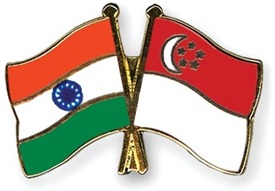 India and Singapore are on a path of increasing economic integration.
The ties that bind these countries have a long history – they are
rooted in a common culture and a shared legacy of being former British
colonies.
India and Singapore are on a path of increasing economic integration.
The ties that bind these countries have a long history – they are
rooted in a common culture and a shared legacy of being former British
colonies. Since 1991 (as a result of India’s Look East trade policy), cultural exchange, immigration and military links between both countries have increased dramatically. By 2001, Singapore-India bilateral trade had increased to S$2.65 billion. In 2005, both countries signed the India-Singapore Comprehensive Economic Cooperation Agreement (CECA).
By the next year, total trade grew four-fold to approximately S$11 billion.
Existing India Singapore Business Relationship
According to International Enterprise Singapore (the national agency responsible for spurring Singapore’s external economy) India became Singapore’s 10th largest trading partner in 2010, registering S$30.7 billion in total trade, up from S$21.6 billion in 2009. Data from the Singapore Indian Chamber of Commerce and Industry (SICCI) shows that as of June 2011, Singapore’s Indian business community has become the single largest country-based business community in Singapore, having grown by 25% within less than a year.The reasons for this deepening trade relationship are multi-fold. Singapore has long been an attractive business destination as companies and investors recognize the value of its unique geographical and political environment. Firms can access most of the major Asian markets from Singapore.
Singapore’s responsive government and efficient legal system results in a pro-business environment which offers low tax rates, sophisticated infrastructure, strong IP protection, progressive immigration policies and an abundance of skilled labour force. Together, these factors have continued to entice entrepreneurs and multinationals to set up business ventures in Singapore.
Many Indian firms and entrepreneurs have done so in recent years. In 2009, Bangalore-based infrastructure giant, GMR Group; and K S Oils, India’s leading integrated edible oil FMCG company set up their regional and international offices respectively in Singapore.
In the same year, August Media was founded in Singapore and within a year, had scored a $60 million deal with US animation giant Classic Media. In September 2010, rope wire manufacturer Usha Martin announced its plans to make Singapore its corporate engineering knowledge center as well as international headquarters. In May 2011, Tata Communications named Singapore as its official international headquarters.
For many Indian entrepreneurs and businesses, Singapore holds a cultural attraction as well. It represents harmonious balance between the East and West and offers a culture that is familiar and comfortable for many Indians. Singapore is a clean, well-functioning cosmopolitan city with low pollution levels, reliable public transportation, high quality educational institutions and increasingly colourful entertainment, dining and arts scene. The recent uptrend in the purchasing of property by Indian expats also demonstrates that many find Singapore an attractive place to live.
How to start a Business in Singapore
If you are considering Singapore as the location for your business, there are some important considerations that you should keep in mind. First of all, you must carefully consider the type of company you plan to setup. For individual foreign entrepreneurs, the clear choice is to incorporate a private limited Singapore company. Foreign companies on the other hand, have a choice of setting up a branch office, a subsidiary company or a representative office in Singapore.
Singapore law allows 100% foreign ownership of Singapore
companies. A Singapore company can be registered with a minimum of one
shareholder, one director, and a paid-up capital of $1 only. Each
company must appoint a Singapore-based company secretary and registered
address and file its annual return with company registrar and income tax
authorities. Since most of the work in Singapore is computerized, it
hardly takes 1 day to register a company in Singapore.
If you are a foreign entrepreneur, you must bear the following in
mind as well. If you plan to relocate to Singapore to run your business,
you must secure a relocation visa of type EntrePass (Entrepreneur Pass) or EmploymentPass.
These two types of visas do not come under any quota system however
they are subject to the applicant satisfying the necessary qualification
criteria. Each application is reviewed and approved by authorities
based on its own merits. Once your relocation visa is approved, your
spouse and children can also relocate to Singapore on Dependant Passes
and you are eligible to apply for permanent residence in due course.Overall, setting up a business in Singapore is quite easy and simple. The country has consistently been ranked highly in international business surveys and reports. Just last year, Singapore was named the city with the highest ease of doing business ranking, highest quality of life ranking in Asia for expatriates, most competitive economy and most efficient bureaucracy by institutions such as the World Bank, ECA International, Gallup and World Economic Forum. To become a part of this growing and dynamic environment, consider setting up your business in Singapore.







0 comments:
Post a Comment